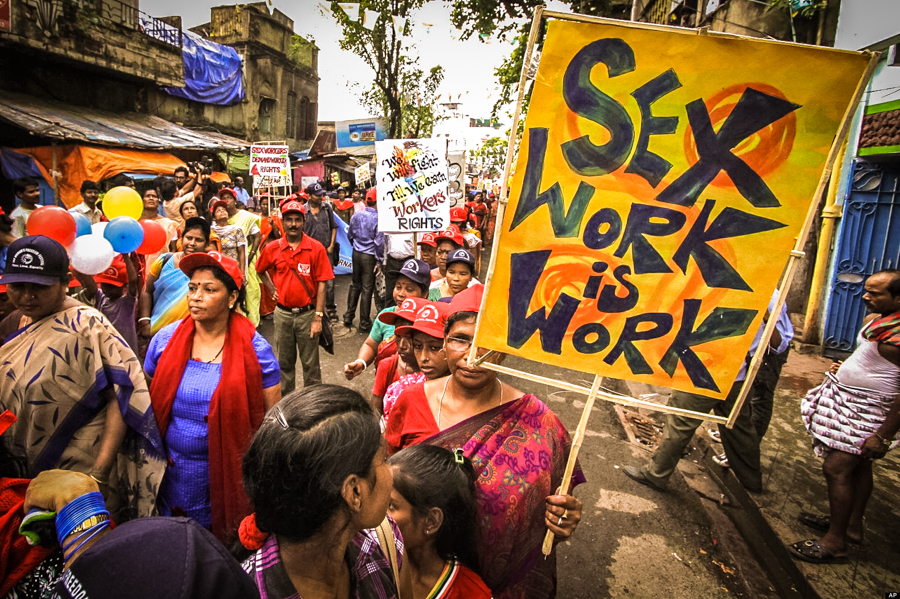There are over 800,000 sex workers in India. However unofficial figures place these numbers far higher. Sex workers organisations and UN agencies have understood and articulated sex work as a contractual arrangement where sexual services are negotiated between consenting adults. Implicit in this consent is the act of agency; wherein sex work can be a realistic choice to sell sex. In India, sex work and prostitution are regulated by the Immoral Traffic (Prevention) Act, 1956. Even though it’s legal for a consenting adult to offer sex for remuneration, the Act renders maintaining brothels, pimping activities and solicitation of customers illegal. A law that intended to prohibit sex slavery and human trafficking, today is prohibiting the work of sex workers.
There are numerous unintended and unseen consequences of the Act that oppress sex workers in India. Since the Act only permits sex work that takes place “alone” (i.e. not in a brothel), it forces sex workers to often visit the clients’ houses/hotels increasing the risk of abuse and violence. Had there been an option to collectively and mutually run the business of sex work, as any other business, it would not only help the sex workers maximize their profits but also enable them to ensure their own safety in the presence of other sex workers.
The Act further mandates that sex work should not be taken up within the radius of 200 m of any public place or inside the brothels. Since brothels are practically also the homes of sex workers, frequent raids and rent seeking often leaves them homeless and harassed. Moreover, prohibition in this case does not ensure that brothels cease to exist, or that pimping does not take place. This is demonstrated by two of the largest red light areas in India: Kamathipura in Mumbai and Sonagachi in Kolkata. These two red light areas are constituted of numerous brothels and pimps who manage the sex workers. By virtue of it being illegal, police officers often harass and extort money out of these sex workers. Further, cases of abuse at the hands of pimps are often not reported to the police either.
The differentiation between sex work from all other occupations and businesses further stigmatises the profession and sex workers themselves. The fear of legal consequences makes it difficult for sex workers to carry on their work, even if done voluntarily. Criminalisation often ends up victimising all the stakeholders involved and the state takes up a paternalistic role excluding them from having a say in creating policy decisions that affect their lives. While the law conveniently criminalises the major aspects of the business, the government has done little to improve the working conditions and the safety of sex workers. The law, in a way, delegitimizes consensual transactions between individuals which also affects the independent sex workers in the industry, as it ends up stigmatizing their work too.
Apart from giving sex workers the freedom to carry out their profession fearlessly, decriminalisation of prostitution and sex work in all forms could significantly contribute to the economy as well. For instance, in Rhode Island, Greece and Thailand, where indoor sex markets were expanded and prostitution was legalised, it resulted in fewer number of rape offences and sexually transmitted diseases (S. Rajeshwari (2018). Formalisation of Labour: The Economics of Prostitution in India. PEOPLE: International Journal of Social Sciences, 4(2).288-303). Further, the sex workers earned well enough to contribute to the economy.
However, in India, there might be a stronger case for decriminalization of prostitution rather than legalisation as the latter could result in severe unintended consequences, like messy regulations that involve licensing etc. Multiple industries (including education) have been victims of the License Raj, and in this case, it would mean that any deviation from the administrative regulation would render an already marginalised sex worker, a criminal.
Thus, to promote freedom of consenting sex trade and to ensure the safety and welfare of the sex workers, urgent reforms are needed to decriminalise sex work in India. There are enough examples worldwide to get inspired from, like New Zealand, for example, which focuses on the healthcare of the sex workers while also stopping red-tapism.
Read more: Big Tech Needs Regulation but Govt Action No Solution
Post Disclaimer
The opinions expressed in this essay are those of the authors. They do not purport to reflect the opinions or views of CCS.






